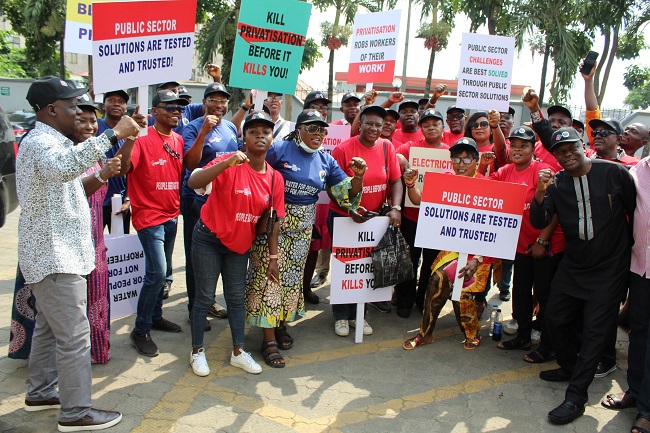The Federal Government has been called upon to reverse the privatisation of the electricity sector and halt discussions on privatising public assets and utilities.

The authorities were also urged to reverse the tariff hikes in the electricity sector and immediately end the balkanisation of Nigerians into tariff bands that they believe create class and segregation.
These submissions are contained in a communique released on Friday, December 13, 2024, at the close of a daylong Symposium on the Socio-Economic and Political Implications of Privatisation of Public Assets and the Way Forward in Lagos State, convened by the Amalgamated Union of Public Corporations Civil Service Technical and Recreational Services Employees (AUPCTRE) and the National Union of Electricity Employees (NUEE) with support from the DGB Bildungs Wek and Public Services International (PSI).
The communique was endorsed by AUPCTRE, NUEE, Renevlyn Development Initiative (RDI), Pan African Vision for the Environment (PAVE), Child Health Organisation, Committee for Defence of Human Rights (CDHR), Peace and Development Project (PEDEP) and Sustainable Research and Action for Environmental Development (SRADev Nigeria).
While asking the Nigerian Senate to convene a Public Hearing to allow Nigerians to air their views on the state of electricity sector privatisation, the group clamoured a halt to World Bank and IMF suggested initiatives on privatising Nigeria’s water assets under the Public Private Partnership (PPP) or any model that puts profits over service delivery and human rights.
They, however, want the adoption of the Public Public Partnership model which, according to them, has proven to be successful “as against privatisation which has become a conduit pipe to fleece the nation”.
While clamouring for sustained investment in human capital development in the public sector to pave way for efficiency and transparency in their operations, the campaigners dememded an end to practices that unfairly target workers in exercises that are carried out to strengthen government institutions.
Instead, they insist, workers should be regularly trained and rated based on performance.
The symposium, which held in Lagos, sought to deepen conversations on the need for review of privatisation of public assets and utilities by the Nigerian government and their dire implications on the citizenry and the economy.
Participants reviewed the electricity sector privatisation which happened in 2013 and ongoing plans by the federal government and some state governments like Lagos to privatise water assets and utilities.
While welcoming the participants, AUPCTRE National President, Comrade Benjamin Anthony, said that privatisation in all forms either in the water or electricity sector must be confronted by labour and civil society. He explained that the failure of the electricity sector privatisation, which was consummated in 2013, was predicted and the same fate would meet the water sector unless ongoing advocacy for its halt is sustained.
The keynote address on Weaning Nigeria of Privatisation in the Age of Remunicipalisation and Democratic Control of Public Utilities was delivered by Professor Mande Hosea Mangu, while a panel discussion session on People Power versus Corporate Takeover of Public Assets set the tone for recommendations on how labour and civil society can collaborate to reverse the privatised entities and stop those currently in the works.
A major highlight of the symposium was also a protest march in Ikeja, Lagos, by the participants to express their rejection of privatisation of state assets and utilities and a call for the reversal of the electricity sector privatisation.
At the end of the discussions, participants observed the following:
- The electricity sector privatisation carried out in 2013 has failed Nigeria’s over 200 million people as power generation has continued to oscillate between 4,000 megawatts and 5,800 megawatts since the exercise was carried out.
- Incessant power grid collapse with the most recent representing the 24th crash in 2024 is a huge embarrassment to the nation.
- Nigerians now depend on their own power generation through electric generators at huge financial, environmental and health costs.
- The incessant hike in electricity tariffs and the balkanisation of Nigerians into electricity bands, suggesting who should get electricity the most is unjust, creates an unnecessary class system in the society as it weighs heavily against poor Nigerians who now struggle to pay for darkness.
- The recent alarm raised by the Nigerian Senate that the electricity sector privatisation has failed and should be reversed represents the reality but the Upper Chamber is yet to work its talk by proposing the ideal way forward.
- There is also a growing trend whereby the power distribution companies abdicate responsibility of installing electricity infrastructure in local communities only to insist on owning those facilities after locals task themselves to put them in place.
- Ongoing plans by the federal and state governments suggesting the privatisation of the nation’s water assets and utilities supported by the World Bank and other multilateral agencies and donors have become very worrisome and unsettling to Nigerians.
- Workers continue to carry the biggest burdens of privatisation through job losses, displacements and uncertainty of job security in their workplaces.
